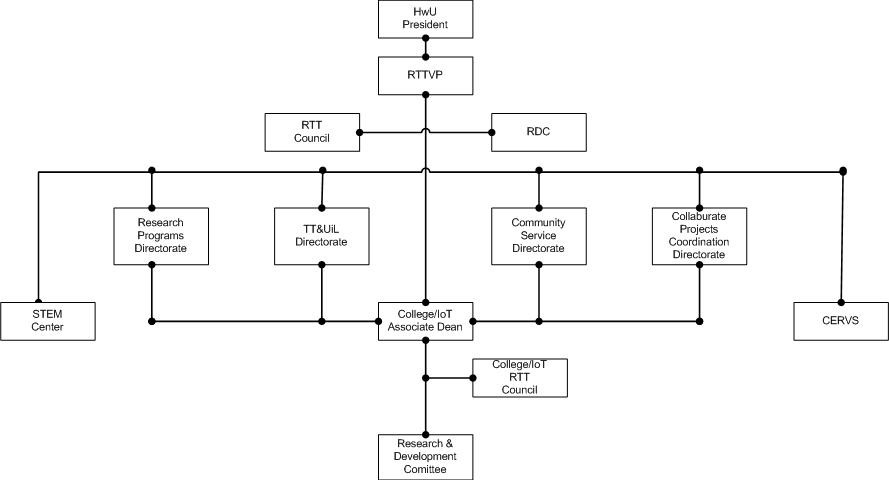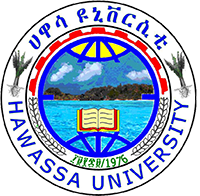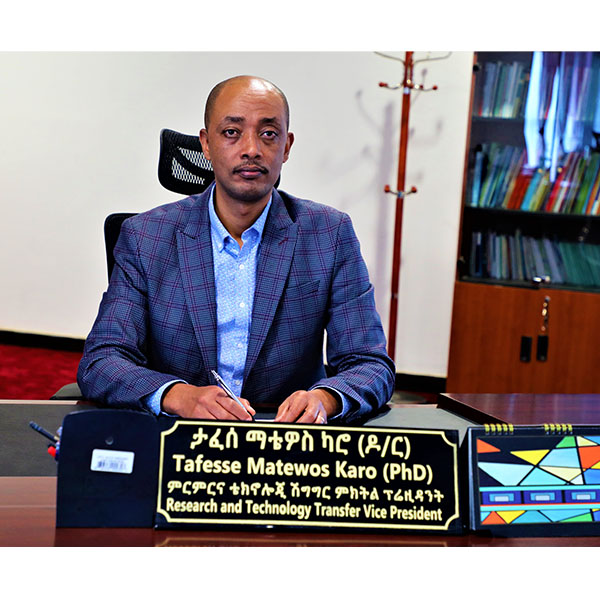Vice President’s message
Very warm welcome to Hawassa University’s official website! Hawassa University (HU) is one of well-established public universities in Ethiopia engaged in teaching, research and community services in the last 44 years. It was established as Awassa Junior College of Agriculture in 1976 with the admission of 217 students. In 2000, it was re-established as a comprehensive University by merging three Colleges. Currently, HwU is one of the top ranking Universities in Ethiopia with 7 campuses, over 40,000 student population & about 7,000 staff. The University aspires to be one of the ten research Universities in east Africa by 2030. Research and Technology Transfer (RTT) have been among the core missions of the Ethiopian Higher Education Institutions (HEI). In light of this mission, HU has identified eleven research thematic areas and carried out many research works in the last two decades. In doing so, HU has contributed its part for the overall development of the country through disseminating several research outputs and technological innovations that contributed for the overall development of the surrounding community and the country at large.
HU has spent about 128 million birrs for research and community activities undertakings in the last four years (2017-2020). In the same years, Hawassa University researchers have published more than 1,800 articles in international peer-reviewed journals across different disciples significantly contributing to the production of new knowledge. On the other hand, the University have invented and adapted 23 technologies in the last five years of which seven granted intellectual property right. These technologies have been transferred to different industries and helped them to solve their problems. Community service provision has been another area of focus for the University. Community services are rendered to communities in seven technology villages focusing on four issues. These are agriculture and natural resources management, health and nutrition, education and training, and free legal services.
Because of HU’s outstanding performances in the areas of research, technology transfer and community services, the University has attracted the attention of several international institutions and organizations for collaborative engagements. Furthermore, the university has excellent records in the administration and management of collaborative projects. Presently, Hawassa University is running more than 65 collaborative projects with several international and national partners.
The university welcomes researchers, Universities and other organizations interested to collaborate with us in the areas of research, technological innovations and community services. The University has very experienced professors and devoted young staffs who are very much committed to working with our esteemed partners.
Sincerely,
The organizational structure of the Office

Major objectives of the Office
Promoting and enhancing research focusing on knowledge and technology transfer consistent with national priority needs is one of the mandates of public higher education institutions indicated in Higher Education Proclamation 1152/2019. In line with this provision, Research and Technology Transfer Vice President Office (RTTVPO) is responsible to lead research projects that consider the needs of the country and enable solving challenges and support the overall development of the country through technology transfer. Specifically, the office is responsible for:
- Develop and implement the institution’s research, technology transfer, university-industry linkage and community service plans and policies;
- Monitor the implementation of the institution’s research, technology transfer, university-industry linkage and community service strategies/plans;
- Make sure that research thematic areas are identified and periodically updated;
- make sure that research, technology transfer, university-industry linkage and community service activities and support systems are functional;
- Enforce the rules and regulations regarding research, technology transfer, university-industry linkage and community service
- Lead financial administration, procurement and transport services related to research and community services of the University;
- Create a conducive environment for technology transfer activities, and coordinate and support researches that lead to production of technology;
- Oversee the delivery of relevant skill training to the academic staff, students and other employees of the institution;
- Create a conducive environment and organizational culture for research, technology transfer, university-industry linkage and community services;
- Oversee the general administration of collaborative project grants or funds for research, technology transfer, university-industry linkage and community service activities;
- Support and oversee the institution’s and its members’ consultancy engagements with the industry or other institutions.
Contact details:
Research Programs Directorate
Research Programs Directorate (RPD) is one of the work units under VPRTT responsible for the coordination of overall research activities at HU. The directorate has the following mandates:
- Plan, organize, lead, manage and control the activities of all university-funded research programs;
- Develop, recommend and implement policies and administrative procedures for research programs;
- Identify thematic research areas;
- Coordinate and oversee research and related activities of the University;
- Propose strategic plans for the development of the University towards excellence in research;
- Prepare annual activity plan of the office and submit it to the VPRTT;
- Prepare periodic reports on research activities in all colleges and institutes of the University;
- Prepare call for research proposals and facilitate the review and approval process;
- Allocate a budget for research proposals approved by the Research and Development Committee;
- Propose incentive mechanisms through which staff and postgraduate students with breakthrough research findings could be rewarded on a competitive basis
- Facilitate the dissemination of research findings of the faculty to end-users and the scientific community
Contact details:
Technology Transfer & University-Industry Linkage Directorate
Technology Transfer and University-Industry Linkage (TTUiL) Directorate another office accountable to the office of Vice President for Research and Technology Transfer. It is mandated to facilitate University-industry collaboration, innovative technology development and transfer to the end-users.
The major activities of the directorate focus on
- Plan, implement, monitor and report all technology transfer and university industry-related activities of the University
- Lead technological innovation/adoption/adaption activities
- Establish and strengthen links with industries
- Facilitate student placement schemes in industries (for internship and externship
- Follow up Technology business incubation center (TBIC)
- Follow up science and technology park (STP)
- Support Enterprise support and development (spin-offs)
- Organize Professional conferences
- Facilitate Patent licensing
Contact details:
Community Services Directorate
Community service directorate is another directorate accountable to the office of vice president for Research and Technology Transfer. The directorate is mandated to coordinate all community services rendered by the University. Specifically,
- Plan, implement, monitor and report all community services-related activities of the University
- Facilitate knowledge and technology transfer in the areas of agriculture and natural resources management, education, health and nutrition, socio-economic aspect
- Follow-up on the effectiveness of community services of the university.
- Create collaborative relations with the community in order to maximize the use of the research results
- Identify and prioritize community services agendas /issues /for intervention
- create a link to facilitate, generate, transmit, apply, and preserve knowledge for the direct benefit of the community and industries
- Promote, popularize and disseminate knowledge and technology to the community
- Guide and support staffs involved in community services provision
- Solicit funds from concerned bodies and if appropriate from the university for community services from other sources
Contact details:
Collaborative Projects Coordination Directorate
The Collaborative Projects Coordination Directorate is another work unit accountable to Research and Technology Transfer Vice President Office. It has the following roles
- Enhances the university’s role in setting partnership with different local and global business, industries, the community and public sector by which activities are rechannelled into the development and support of the curriculum and teaching-learning process;
- Facilitate the participation of various stakeholders so that collaborative projects can properly carry out their activities;
- Create collaborative projects database at the university level and update regularly;
- Sets ground to increase collaborative projects/ research grants contribute to the revenue of research and professional practice activities across the university, thereby reducing dependence on public funding for research;
- Builds the capacity of staff in networking and grant writing, and address globally posted calls for a grant application; and
- Monitors and supports the implementation of the projects to bring desirable change in the community as per the agreement.
Contact details
Centre for Ethiopian Rift Valley Studies
Ethiopian rift-valley region (ERVR) is endowed with unique features of natural resources and extensive cultural heritage. The region offers a wide-ranging opportunity for research on natural and social sciences – particularly on the Ethiopian rift valley lakes and the indigenous culture.
- Advance excellence in research on the Ethiopian Rift Valley Region (ERVR).
- Cater for interdisciplinary research and education that contribute to the livelihoods of the population in the region.
- Create linkages with Higher Education and Research Institutions (HERIs), governmental agencies, and NGOs that are involved in studies on the region.
- Serves as a vital organ of the HU in disseminating knowledge about ERVR.
- Support graduate students who intend to carry out interdisciplinary research on issues related to the region.
- Work with different offices of the region and play a decisive role in addressing issues critical to understanding the environmental, social, and economic issues of the region.
Contact details:
Science, Technology, Engineering and Maths (STEM) Centre
STEM is another work unit under Research and Technology Transfer Vice President Office. The Center performs the following activities:
Science shared campus program
Science shared campus program is one of the STEM education and training programs which is designed to deliver practical oriented and high-quality education and training (hands-on laboratory-based training) in Science, Technology, Engineering and Mathematics (STEM) to students from grade 9 to 12 based on the school syllabus and using similar textbooks.
STEM outreaches
STEM outreach is another type of program which offers annual semester break and summer - STEM education for students from grade 7 to 12 those have special talents and performances from the schools in the nearby/university catchment/areas, by carrying out various activities such as science fairs, after school activities, etc.
Science fair
Science fair is a typically a competitive exhibition of science projects usually prepared and presented by selected schoolchildren. Science fair in STEM the students can share their projects, ideas with their friends, parents and people who visit the fair.
STEM center visit program
The center organizes visiting programs and field trips to industries and other selected places in the university catchment areas with the aim of introducing the real-world applications of STEM concepts. In addition, the center facilitates school students and the community to visit STEM center facilities.
Robotics
It is Weekend, semester break, and summer STEM education for students from grades 7 to 12. The students obtain basic computer skills, electronics sciences and programing to write programs using different software.
Lab Session
This is also Weekend, semester break, and summer STEM education. The lab sessions are prepared for High school students based on the syllabus.
Girls in STEM online
The program is designed for Girls only STEM education online with New York Sciences Academy.
Contact details:




